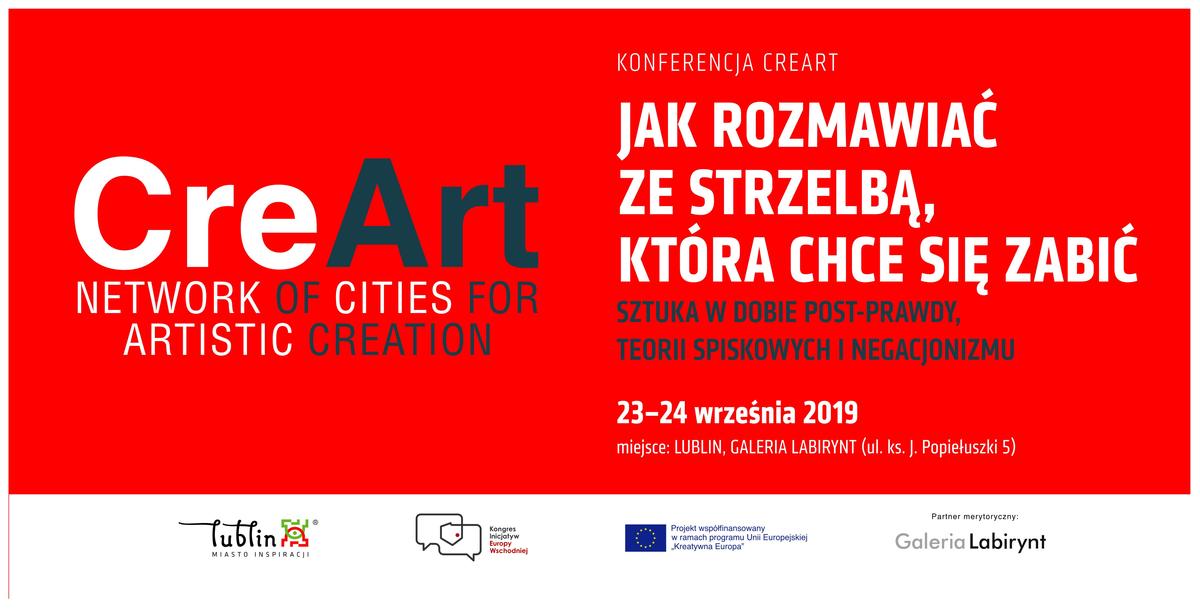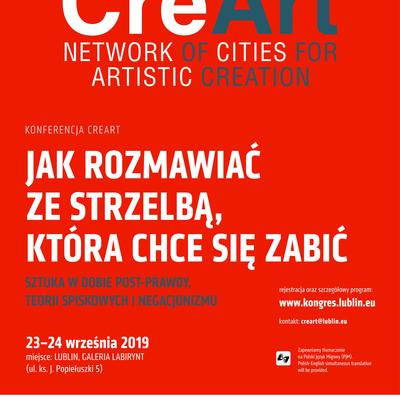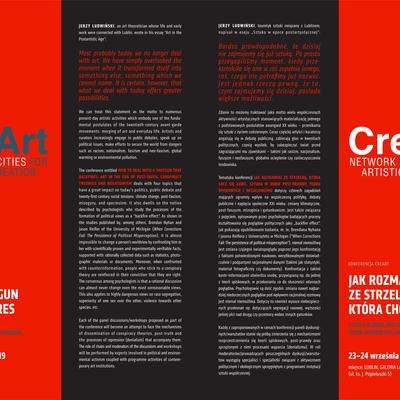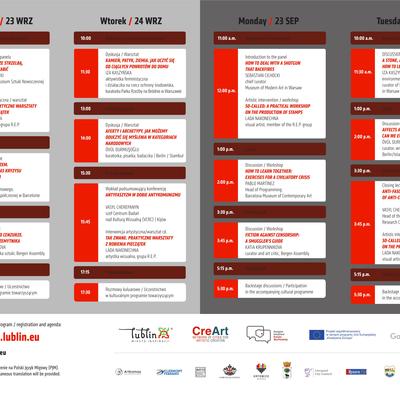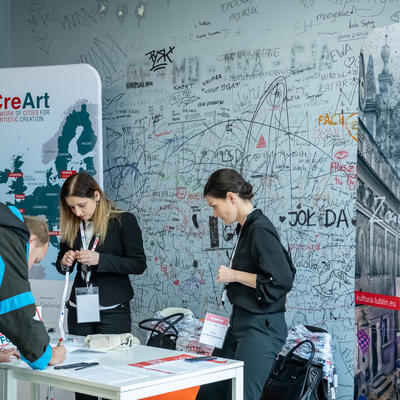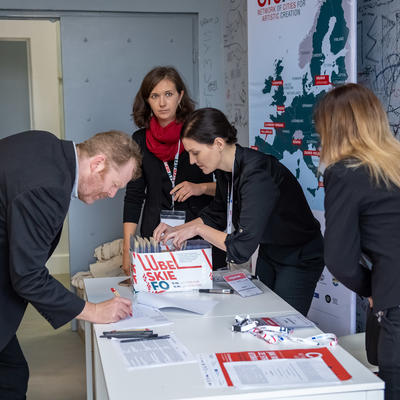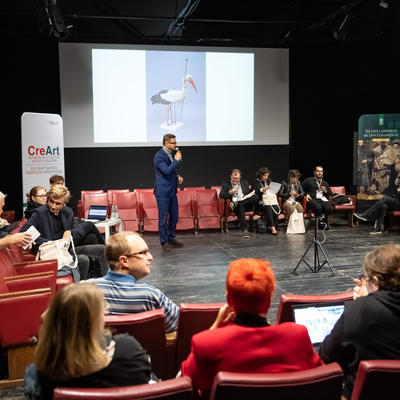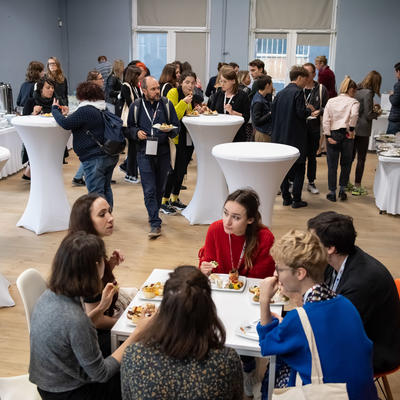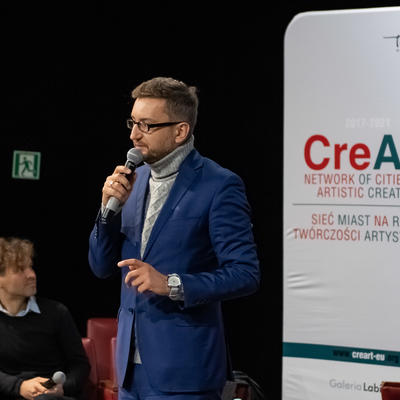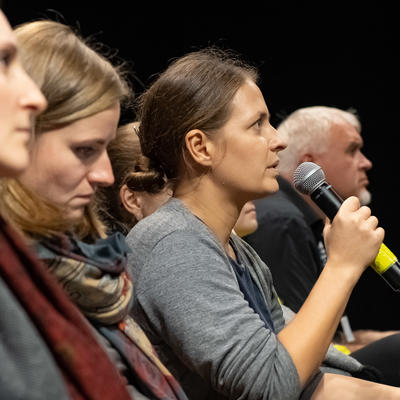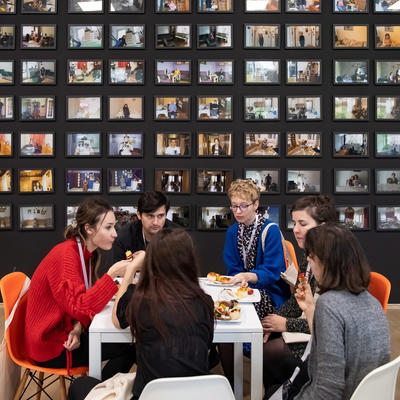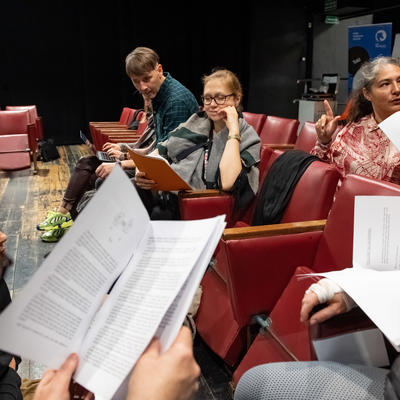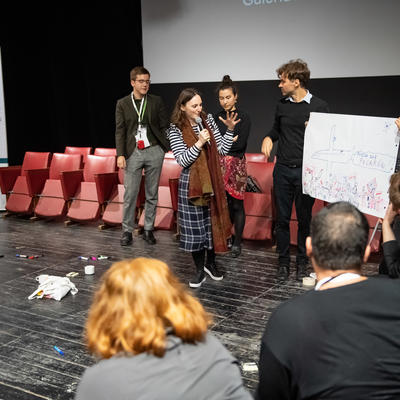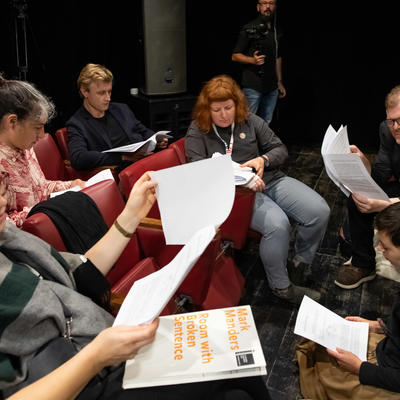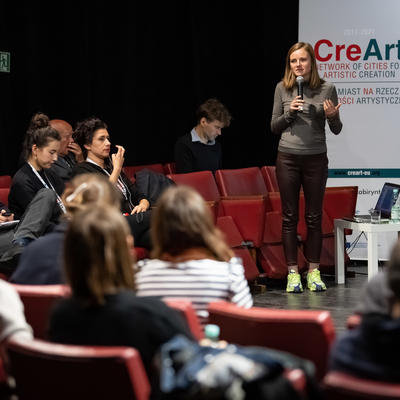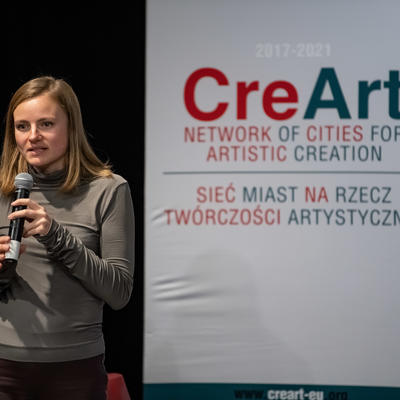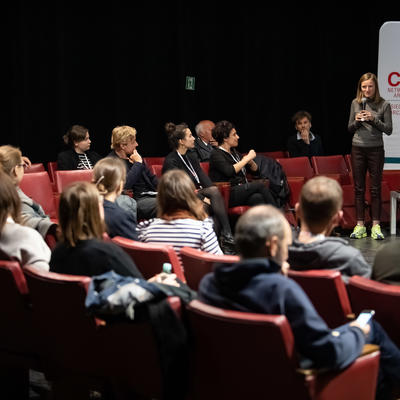CreArt Conference How to deal with a shotgun that backfires. Art in the era of post – truth, conspiracy theories and negationism. 23-24 Sep
CreArt conference: How to deal with a shotgun that backfires. Art in the era of post – truth, conspiracy theories and negationism
organised within the project „CreArt. Network of Cities for Artistic Creation”
co-funded by the Creative Europe programme of the European Union
23 – 24 September 2019
venue: Lublin, Galeria Labirynt
(5 ks. J. Popiełuszki Street)
Jerzy Ludwiński, an art theoretician whose life and early work were connected with Lublin, wrote in his essay “Art in the Postartistic Age”: “Most probably today we no longer deal with art. We have simply overlooked the moment when it transformed itself into something else, something which we cannot name. It is certain, however, that what we deal with today offers greater possibilities.” We can treat this statement as the motto to numerous present-day artistic activities which embody one of the fundamental postulates of twentieth-century avant-garde movements: merging of art and everyday life. Artists and curators increasingly engage in public debates, speak up on political issues, make efforts to secure the world from dangers such as racism, nationalism, fascism and neo-fascism, global warming or environmental pollution.
The conference entitled “How to Deal with a Shotgun that Backfires”: Art in the Era of Post-truth, Conspiracy Theories and Negationism deals with four topics that have a great impact on today’s politics, public debate and twenty-first-century social tensions: climate change, post-fascism, misogyny, and speciesism. It also dwells on the notion described by psychologists who study the processes of the formation of political views as a “backfire effect.” As shown in the studies published by, among others, Brendan Nyhan and Jason Reifler of the University of Michigan (When Corrections Fail: The Persistence of Political Misperception), it is almost impossible to change a person’s worldview by confronting him or her with scientifically proven and experimentally verifiable facts, supported with rationally collected data such as statistics, photographic materials or documents. Moreover, when confronted with counterinformation, people who stick to a conspiracy theory are reinforced in their conviction that they are right. The consensus among psychologists is that a rational discussion can almost never change even the most unreasonable views. This also applies to highly dangerous views on race segregation, superiority of one sex over the other, violence towards other species, etc.
Each of the panel discussions/workshops proposed as part of the conference will become an attempt to face the mechanisms of dissemination of conspiracy theories, post-truth and the processes of repression (denialism) that accompany them. The role of chairs and moderators of the discussions and workshops will be provided by experts involved in political and environmental activism coupled with programme activities of contemporary art institutions.
Introduction to the panel:
Sebastian Cichocki | chief curator, Museum of Modern Art in Warsaw
HOW TO DEAL WITH A SHOTGUN THAT BACKFIRES
Sebastian Cichocki is a curator, writer and critic, working as the chief curator at the Museum of Modern Art in Warsaw. His selected exhibitions include: The Bródno Sculpture Park (2009-2019), the Polish pavilions at the 52nd and 54th Venice Biennales, Making Use: Life in Postartistic Times (2016), Zofia Rydet, Record 1978-1990 (2015), New National Art: National Realism in Poland of the 21st Century, Museum of Modern Art in Warsaw (2012) and Rainbow in the Dark: On the Joy and Torment of Faith, SALT Istanbul (2014).
Participants:
Lada Nakonechna | visual artist, member of the R.E.P. group
SO-CALLED: A PRACTICAL WORKSHOP ON THE PRODUCTION OF STAMPS
Lada Nakonechna is an artist who lives and works in Kyiv. She is a member of the curatorial and activist group Hudrada and co-editor of Prostory.net.ua, the journal for literature, art and politics. Since 2005 Nakonechna has been a member of the R.E.P. (Revolutionary Experimental Space) group. Since 2012 she has been the curator of the Course of Art, an independent educational program in Kyiv; she is also a co-founder of the Method Fund, an independent, nonprofit organization aimed at supporting and developing contemporary art and culture in Ukraine. She investigates through experience various ways to study and practice art nowadays and is interested in art as a communal activity. Her works, which often call attention to principles of visual cognition and expose the manipulative aspects of visual and verbal structures, are founded on a belief in the emancipatory potential of art. She has participated in numerous international and Ukrainian exhibitions including exhibitions at the National Art Museum of Ukraine (Kyiv, 2011, 2012, 2017), CSW Zamek Ujazdowski (Warsaw, Poland, 2012), Museum of Modern Art (Warsaw, 2015), Galerie für Zeitgenössische Kunst (Leipzig, Germany, 2015), Kunstmuseum Wolfsburg (Germany, 2015), Kunsthalltrondheim (Norway, 2015), Daad gallery (Berlin, Germany, 2014), WUK Kunsthalle Exnergasse (Vienna, Austria, 2016), Museum of Contemporary Art Zagreb (Croatia, 2018), Palais Populaire, Berlin (Germany, 2018). Nakonechna is a recipient of the Kazimir Malevich Artist Award (2014) and the PinchukArtCentre Special Prize (2013).
About the workshop
The workshop prepared by an Ukrainian artist Lada Nakonechna consists in group production of stamps and a discussion on the topic of their modern application as a political tool in public space for manipulation, demonstration or resistance purposes. In the theoretical part the artist will discuss questions connected with works of art that touch upon issues of the language and translation, focussing especially on the present socio-political situation in Ukraine in the context of war, censorship, attacks of extreme right and the growing opposition on the part of non-governmental institutions. The workshop is open for everybody willing to participate in it, without any specific preference.
Pablo Martínez | Head of Programming, Barcelona Museum of Contemporary Art
HOW TO LEARN TOGETHER: EXERCISES FOR A CIVILIATORY CRISIS
Pablo Martinez is the Head of Programming at MACBA in Barcelona. His research focuses on educational work with the body and the potential of images for constructing political subjectivity. He was the Head of Education and Public Activities at CA2M (2009–16), and Associate Professor of Contemporary Art at the Faculty of Fine Arts of the Universidad Complutense de Madrid (2011–15). He is the Editorial Secretary of the journal of art and visual culture Re-visiones and a member of Las Lindes, a research and action group working on education and cultural and artistic practices. He has co-edited, with Yayo Aznar, Arte actual: Lecturas para un espectador inquieto (CA2M, 2011) and edited No sabíamos lo que hacíamos: Lecturas para una educación situada (CA2M, 2017). He curated solo shows of Werker Magazine and Adelita Husni-Bey.
About the workshop
The workshop is connected with two themes: climate crisis and homophobia. It will have the form of a reading session and a discussion on radical education and art institutions in the twenty-first century. Pablo Martinez will introduce to the participants of the session methods and tools used in the Museum of Modern Art (MACBA) in Barcelona in their work with different audiences threatened with exclusion. During the discussion the participants will also cook together as gastronomy constitutes a significant part of educational practices applied in MACBA. Potential participants: individuals interested in cultural policies, education, emancipation, cooking and food production, as well as in the end of the world, arts and crafts.
Katia Krupennikova | curator and art critic, Bergen Assembly
FICTION AGAINST CENSORSHIP: A SMUGGLER’S GUIDE
Katia Krupennikova is a curator and art critic. She is part of the team of Bergen Assemblies 2017-2019 and earlier worked at the Centre for Contemporary Art at Ujazdowski Castle in Warsaw. In 2015 she won Akbank Sanat International Curator Competition. Her other recent projects include "It Won’t Be Long Now, Comrades!" (co-curated with Inga Lāce), "Framer Framed", 2017; and Women Commentators: Russia and Ukraine, National Museum Królikarnia by invitation of Katarzyna Kozyra foundation (Warsaw, 2014).
About the workshop
During the workshop prepared by Katia Krupennikova the participants will become acquainted with various examples of creative use of “smuggling” as a strategy of dissemination of political resistance during the time of Soviet censorship. Working in groups, they will be able to “smuggle” their own life stories. As a result of the workshop, they will create on the basis of examples taken from history and imagination, a kind of useful guidebook consisting of methods and tools serving to cheat the censor’s eye. Individuals with no experience and knowledge on politically engaged art can participate in the workshop as well.
Iza Kaszyńska | environmental and feminist activist, curator of the Bródno Sculpture Park in Warsaw
A STONE, A STICK, SOIL: HOW TO LEARN FROM ALWAYS COMING HOME
Iza Kaszyńska is a culture expert, animator and organizer of social and cultural events, co-curator of Venice Biennale at the district of Bródno in Warsaw, the 9th edition of the Sculpture Park. She has been engaged in city and community activism with a focus on urban gardening. Among her other activities she co-founded the communal garden “Jedność” (“Unity”) in the area of Family Allotment Gardens at Czerniakowska Street in Warsaw and “Motyka i Słońce” (“The Hoe and the Sun”) in the area of the Jazdów settlement in Warsaw. In the framework of the Sculpture Park in Bródno she created and has coordinated the Orangery, a community greenhouse. She has worked in the field of modern art as a curator, coordinator and producer.
About the workshop
The workshop is connected with the theme of climate crisis. The constant awareness of the climate crisis brings us to the vicious circle of active involvement, nostalgia, anger and a sense of hopelessness. The workshop will have the form of a city drifting (wandering) focused on the practices of “deep listening” and conversation that help deal with people who deny and negate the knowledge of climate changes, especially family members and close friends. Kaszyńska will use methodology drawn from the experience of “deep ecology,” the knowledge of tribal peoples and anarchistic groups.
Potential participants: individuals interested in ecology, climate changes, feminism and work on behalf of non-human creatures.
Övül Durmuşoğlu | curator, writer, researcher | Berlin/Istanbul
AFFECTS AND ARCHETYPES: CAN WE EVER UNLEARN NATION?
Övül Durmusoğlu is a curator and writer working in the intersection of contemporary art, politics, critical and gender theory and popular culture. She currently works as a guest curator and advisor to the newly established MMAG Foundation in Amman. In the past, she was curator for steirischer herbst festival in Graz; curator/director for YAMA public screen in Istanbul; curatorial advisor for Gülsün Karamustafa’s Chronographia at Hamburger Bahnhof in Berlin and artistic director for the festival Sofia Contemporary 2013. She curated programs within the 10th, 13th and 14th Istanbul Biennials; coordinated and organized different programs and events at Maybe Education and Public Programs for dOCUMENTA (13). Durmusoğlu was a guest professor for curatorial theory and praxis in Nuremberg Fine Arts Academy and continues to teach as a visiting lecturer in Muthesius Kunsthochschule in Kiel.
About the workshop
Övül Durmusoğlu will focus on those archetypes inherited by societies that can become useful tools used by populist politicians. The workshop concentrates on techniques of control and manipulation and methods that protect against them via the processes of collecting, story-telling and decoding archetypes that are present in the public discourse in Poland. Before the workshop its participants will have an opportunity to read the texts selected by Durmusoğlu.
Potential participants: individuals interested in feminism, political activism and story-telling.
Closing lecture
Vasyl Cherepanyn | Head of the Visual Culture Research Center (VCRC) | Kyiv
ANTI-FASCISM IN THE AGE OF ANTI-COMMUNISM
Vasyl Cherepanyn is Head of the Visual Culture Research Center (VCRC, Kyiv), he works as a lecturer at the Cultural Studies Department of the University of Kyiv-Mohyla Academy and holds a Ph.D. in philosophy (aesthetics). He has been lecturing at European University Viadrina in Frankfurt (Oder), University of Helsinki, Free University of Berlin, Merz Akademie in Stuttgart, University of Vienna, Masaryk University in Brno, Institute for Advanced Studies of the “Political Critique” in Warsaw, Greifswald University. He was also a visiting fellow at the Institute for Human Sciences in Vienna. He recently co-edited Guidebook of The Kyiv International (Medusa Books, 2018) and '68 NOW (Archive Books, 2019) and curated The European International (Rijksakademie van Beeldende Kunsten, Amsterdam) and Hybrid Peace (Stroom, The Hague) projects. VCRC is the organizer of The School of Kyiv – Kyiv Biennial 2015 and The Kyiv International – Kyiv Biennial 2017. VCRC has received the European Cultural Foundation's Princess Margriet Award for Culture in 2015, and the Igor Zabel Award Grant for Culture and Theory 2018.
In the lecture summing up the conference “How to Deal with a Shotgun that Backfires: Art in the Era of Post-truth, Conspiracy Theories and Negationism” Vasyl Cherepanyn will analyse the present political situation in Europe concentrating on the growth of populism and extreme right as well as a potential for anti-fascist resistance. He will also touch upon the motif of “decommunisation” in Ukraine, Poland and Germany, the authoritarian tendencies in Turkey and Russia, and populism in Austria and Italy. The main goal of the lecture is an attempt to trace the process of normalization of post-fascism and epigones of old ideologies.
Registration: https://kongres.lublin.eu/en/registration
The registration form will be active until 8 September 2019.
Photo gallery
Return to Conference


